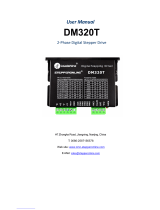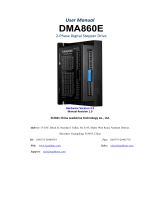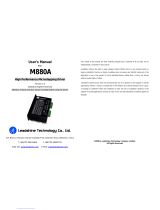Page is loading ...

01.03.2020 v3
High Performance Microstepping Driver
User Manual
P542
Astrosyn International Technology Ltd
The Old Courthouse, New Road Avenue, Chatham, Kent ME4 6BE England
Telephone: +44 (0) 1634 815175 Fax: +44 (0) 1634 826552
Email: sales@astrosyn.com Web: www.astrosyn.com
Registered office: Montague Place, Quayside, Chatham Maritime, Kent. ME4 4QU Registered in England No. 1188550
Thank you for purchasing the Astrosyn P542 drive.
Please read this manual thoroughly before installing
and operating the driver and always keep the manual
where it is readily accessible.

01.03.2020 v3
Table of Contents
Page
General 1
Features of the Driver 1
Applications of the Driver 1
Specifications and Operating Environment 2
Electrical Specifications 2
Operating Environment and Parameters 2
Driver Connectors, P1, P2 and P3 2
Control Signal Connector P1 Pins 2
Power Connector P2 Pins 2
Power Connector P3 Pins 2
Power Supply Selection 3
Maximum Voltage Input 3
Regulated or Unregulated Power Supply 3
Multiple Drivers 3
Driver Voltage and Current Selection 4
Selecting Supply Voltage 4
Setting Proper Output Current 4
Microstep Resolution and Driver Current Output 4
Microstep Resolution Selection 4
Current Setting 4
Driver connection to Motors 5
Driver Dimensions 5

01.03.2020 v3
1. GENERAL
The P542 is a fully digital high performance microstepping driver based on the latest DSP
technology.
It is suitable for driving 2-phase and 4-phase hybrid stepping motors.
Features of this Driver:
➢ High Performance at low cost
➢ Supply voltage 20V dc to 50V dc
➢ Current selectable from 1.0A to 4.0A / phase
➢ Inaudible chopping frequency
➢ TTL compatible and optically isolated input signals
➢ Automatic idle-current reduction
➢ Mixed-decay current control for reduced motor heating
➢ 16 Channel microstepping in decimal and binary
➢ Suitable for 4, 6 or 8 lead motors
➢ Step, Direction and Enable inputs
➢ Short-circuit, open-circuit, under / over voltage and over temperature
protection.
Applications of this Driver:
Suitable for a wide range of stepping motors of Size NEMA 17, 23, and 34, usable for various
kinds of machines, such as X – Y Tables, labelling machines, laser cutters, engraving
machines, and pick-place devices; particularly useful in applications with low noise, low
vibration, high speed and high precision requirements
Page 1

01.03.2020 v3
2. SPECIFICATIONS AND OPERATING ENVIRONMENT
Electrical Specifications (T = 25C)
Parameters
Min
Typical
Max
Remark
Peak Output Current
1.0A
By User
4.0A
By DIP Switch
Supply Voltage (DC)
+20V
+36V
+50V
Logic Signal Current
6mA
10mA
30mA
Pulse Input Frequency
0
By User
200 kHz
Minimum Pulse Rate
2.5µs
Operating Environment and Parameters
Coolant
Natural Cooling or forced ventilation / heatsink
Environment
Space
Avoid dust, oil, frost and corrosive gases
Temperature
0C to 50ºC
Humidity
40% to 90%RH
Vibration
5.9m/s
2
Max
Storage Temp.
-20 ºC to +65ºC
Weight
Approx 300g
3. DRIVER CONNECTORS, P1, P2 and P3
The following is a brief description of the two connectors of the Driver.
Control Signal Connector P1 Pins
Pin No.
Signal
Functions
1
Pulse +
Connect to +5v dc
2
Pulse -
Triggers motor to move
3
Direction +
Connect to +5v dc
4
Direction -
Triggers change in direction of rotation
Please note motion direction is also related to motor-drive wiring. Changing the
connection of two-wires for a coil to the drive will also reverse motion direction.
SW4 OFF for Pulse and Direction and On for CW/CCW operation.
Power Connector P2 Pins
Pin No.
Signal
Functions
5
Enable +
Connect to +5 vdc
6
Enable -
Connect to 0v to disable drive
Power Connector P3 Pins
Pin No.
Signal
Functions
7
Ground
Negative Power Supply 0v
8
VCC
Power supply +20V to +50V dc
9, 10
Phase A
Motor coil A (leads A+ and A-)
11, 12
Phase B
Motor coil B (leads B+ and B-)
Page 2

01.03.2020 v3
4. POWER SUPPLY SECTION
It is important to choose the appropriate power supply to make the driver operate
properly.
Maximum Voltage Input:
The internal power supply can operate from 20V to 50V dc, including power input
fluctuation and back EMF voltage generated by motor coils during motor shaft
deceleration.
Higher voltage will damage the driver. Therefore, it is suggested to use power supplies
with theoretical output voltage of no more than +50V, leaving room for power line
fluctuation and back EMF
Regulated or unregulated power supply:
Both regulated and unregulated power supplies can be used to supply DC power to the
drive. However, unregulated power supplies are preferred due to their ability to
withstand current surge. If regulated power supply (such as most switching supplies) is
used, it is important to have a large current output rating to avoid problems like current
clamp. For example, using a 4A supply for a 3A motor drive operation. You can use a
power supply of lower current rating than that of the motor (Typically 50%~70% of
motor current). The reason is that the drive draws current from the power supply
capacitor only during the ON duration of the PWM cycle, but not during OFF duration.
Therefore, the average current withdrawn from the power supply is considerably less
than the motor current. For example, two 3 A motors can be supplied by one power
supply of 4A rating.
Multiple Drivers:
It is recommended that multiple drives share one power supply to reduce cost,
provided that the supply has enough capacity. DO NOT daisy-chain the power supply
input pin of the drivers (connect them to power supply separately) to avoid cross
interference.
Higher supply voltage will allow higher motor speed to be achieved. If the speed
requirement is low, it’s better to use lower supply voltage to improve noise, heating and
reliability.
NEVER connect power and ground incorrectly, it will damage the driver.
Page 3

01.03.2020 v3
5. DRIVER VOLTAGE AND CURRENT SELECTION
Selecting Supply Voltage:
Higher supply voltage can increase motor torque at higher speeds. However, higher voltage
may cause more motor vibration at lower speeds. It may also cause over-voltage protection
and even damage the drive. Therefore, it is suggested to choose only sufficiently high supply
voltage for intended applications.
Setting Output Current
For a given motor, higher drive current will improve motor output torque, but at the same time
cause more heating in the motor and driver. Therefore, output current is generally set to be such
that the motor will not overheat during lengthy operation.
Since parallel and serial connections of motor coils will significantly change resulting inductance
and resistance, it is important to set driver output current depending on motor phase current,
motor leads and connection method.
6. MICROSTEP RESOLUTION
Current Setting (Peak)
SW1, 2, 3 are used to set the operating current during motion (dynamic current)
Current
SW1
SW2
SW3
1.0A
On
On
On
1.2A
Off
On
On
1.5A
On
Off
On
2.0A
Off
Off
On
2.5A
On
On
Off
3.0A
Off
On
Off
3.5A
On
Off
Off
4.0A
Off
Off
Off
Microsteping Resolution Selection
Microstep Resolution is set by DIP SW5, 6, 7 and 8 as shown in the following table:
Step/Rev 1.8 Motor
SW5
SW6
SW7
SW8
200
On
On
On
On
400
Off
On
On
On
800
On
Off
On
On
1600
Off
Off
On
On
3200
On
On
Off
On
6400
Off
On
Off
On
12800
On
Off
Off
On
25600
Off
Off
Off
On
1000
On
On
On
Off
2000
Off
On
On
Off
4000
On
Off
On
Off
5000
Off
Off
On
Off
8000
On
On
Off
Off
10000
Off
On
Off
Off
20000
On
Off
Off
Off
40000
Off
Off
Off
Off
Please Note: DC Power must be removed before changing settings and re-applied after
alteration
Page 4

01.03.2020 v3
7. DRIVER CONNECTION TO MOTOR
Series Connection
P542 drive can drive any 4, 6 or 8 lead hybrid stepper motors.
Series Connection:
A series configuration would typically be used in applications where a higher torque at
lower speeds is required. Because this configuration has the most inductance, the
performance will start to degrade at higher speeds. Use the per phase (or unipolar)
current rating divided by 1.4 to determine the peak output current
Parallel Connection
An 8 lead motor in parallel configuration offers a more stable, but lower torque at lower
speeds. Because of the lower inductance, there will be higher torque at higher speeds.
Multiply the per phase (or unipolar) current rating by rating by 1.4 to determine peak output
current.
8. DRIVE DIMENSIONS
Page 5
/










